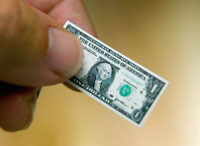Declining dollar shrinks trade deficit
The United States trade deficit narrowed in May as exports, including industrial supplies and consumer goods, climbed to records.

The latest snapshot of trade activity, reported by the Commerce Department on Friday, showed that the nation’s trade gap decreased to $59.8 billion, largely because of the declining dollar. That was down 1.2 percent from April’s trade deficit and was the best showing since March.
The improvement came even as imports, including crude oil, rose to records. Many economists had expected the trade gap to widen, and were forecasting a deficit of $62.2 billion, on average, in May.
Exports of American-made goods and services totaled $157.6 billion in May, a 0.9 percent increase from April. The declining value of the dollar relative to other currencies, especially the euro, is helping to make American exports cheaper and thus more attractive to foreign buyers. Growth in exports has been one of the few bright spots for the economy, which has been pounded by housing, credit and financial crises.
Imports of goods and services grew to a record of $217.3 billion in May, a 0.3 percent increase from the previous month.
The stronger export figures should help bolster overall economic growth during the April-to-June quarter, which is already shaping up to be better than the grim projections made at the start of the year, when many feared the economy might contract. Tax rebates also are energizing shoppers, which should help second-quarter activity, the AP reports.
The dollar continued to decline against the euro, at close to a record low as market players failed to be reassured by the U.S. Treasury's emergency plan to support mortgage lenders Fannie Mae and Freddie Mac.
Market players will be looking ahead to the release of U.S. retail sales and producer price index, and Federal Reserve chairman Ben Bernanke's testimony to the Senate Banking Committee.
'Bernanke might provide some conciliatory words to provide support to the market, but given the current softness of the dollar, the data releases will also be crucial,' said an analyst at BNP Paribas.
Elsewhere, the euro will come into focus with the release of the ZEW institute's German economic expectations index, which is expected to continue declining in July to -57.0 from -52.4 in June, Thomson Financial reports.
'We put our money on a weak reading supporting our view that the German economy will either develop a severe growth slowdown or fall into recession,' said an analyst at BNP Paribas.
Source: agencies
Subscribe to Pravda.Ru Telegram channel, Facebook, RSS!




